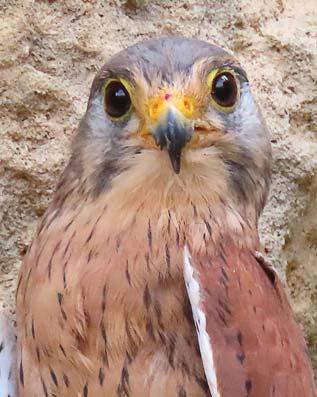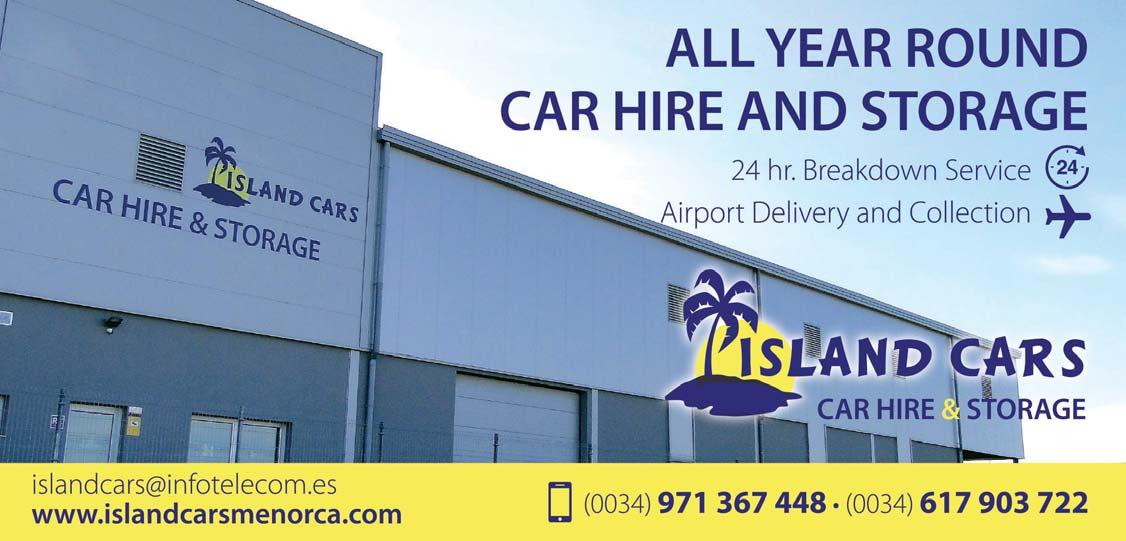
3 minute read
MENORCA’S WILD ANIMAL RECOVERY CENTRE

Animal Recovery run by GOB and last year they cared for 1388 animals of 81 different species. The majority of animals that enter the centre have suffered from accidents due to human activity: on roads, power lines, collisions with large windows, and other dangers from urban environments. GOB also deals with the effects of invasive species on the local animals.
652 tortoises were brought to the Centre in 2022 and they are by far the most assisted species. Most of them came from captivity, but 175 were involved in accidents, mostly on the road. Other admissions include bird chicks that have been born in towns or fallen out of their nests and abandoned or birds that have collided with cars or flown into large windows.

35 birds were brought in because of electrocution by power lines last year. Those affected are usually large birds such as ravens, raptors and gulls. Other causes of injuries are abandoned fishing nets and plastic ropes that affect gulls and marine turtles. Attacks by dogs and cats on wild animals led to 19 admissions. Also notable were 19 cases of birds falling into water tanks, including raptors. It is possible to reduce this problem by putting floating ramps in the tanks so that the animals that fall in accidentally can get out.
Exotic invasive species are a problem for wild animals, especially water turtles from Florida some of which have been freed into the wild and have established themselves in different damp areas of Menorca. Now the law prohibits ownership of these turtles, and anyone owning one should take it to the Centre and never release it into the wild. Last year they received 28 exotic turtles.
The facilities have a flight space, which facilitates the rehabilitation of birds that need to recover their full ability to fly, and also a space where animals live if they cannot be released from back into the wild.
The Centre of Recuperation of Menorca is able to work thanks to a collaborative effort of many volunteers and organisations. Its management by GOB is made possible through a collaboration agreement with the Consorci de Fauna de les Illes Balears (COFIB). Essential, also, is the help of the Lithica Foundation which provides the space for the Centre. The Centre is supported by the veterinary clinic of Jaume Pons, the Consell Insular (Menorca Island Governing Council) and the town Halls of Ciutadella, Maó, Es Mercadal, Ferreries, Sant Lluis and Es Castell. The local police, the Environment Agencies and SEPRONA (The Nature Protection Service of the Guardia Civil) also offer their help, as well as shops and businesses providing food.

How to Get involved
You can Sponsor an individual animal or the animal hospital with donations starting at just 20 Euros. There are pictures and descriptions of each animal on the website https://aporta. gobmenorca.com/

The Centre could not operate without a group of 20 volunteers which take home and care for the chicks. Volunteers can also get involved in the maintenance and improvement of the facilities. The Centre holds open days and organises school visits to explain to educate children about the species that come to the Centre and the problems they suffer. Since 2013 the Centre has been open to the public and tickets are available when you visit the Lithica. A Lithica ticket is 4€ for residents, or 7€ for non-residents. (Under 13 years old free of charge). Once inside you can then visit the Centre, where they will ask you for a €2 supplement. It is recommended to buy the ticket for the Lithica in advance at https://lithica.es/visita/ , although it can also be purchased on site. The access to the Pedreres de s’Hostal is on the Old Road of Ciutadella, km 1.
I have found an injured animal. What I do?: call 619 834 597
WILDLIFE EMERGENCY TELEPHONE NUMBER: 619 834 597, 971 350 762, 112

GOB’s Animal Recovery Centre offers the following tips to keep in mind if you find an animal needing help. Each species has particular habits and needs and it is necessary to act in a specific way so as not to cause further damage. If you have any doubts you can call them for advice.
Before you take it: check first that you need their help. Sometimes an animal has fallen out of the nest, but the parents continue to feed it. If its not hurt or in danger, it’s best to leave it where it is. Wild animals are often afraid, and try to defend themselves when you want to catch them. To avoid grabs and bites, it is better to catch them with a towel or a thick sweater.
Transport: if you can, put the animal inside a cardboard box, covered so that it is dark inside, with small holes so that air can enter and a pad or a towel at the bottom. Do not put food or water. And remember not to leave the box in the closed car if it’s hot.

Feeding: an injured animal should never be fed or given water as this could kill it if it is dehydrated
Care: do not try to cure it on your own. It is better to have it done by a vet.
Management: it is necessary to minimize the contact of the animal with people or domestic animals. Fear produces a nervousness that is detrimental to its situation. Deliver the injured animal to GOB as soon as possible
Pick up and transfer: The injured animal can be delivered to any of the GOB facilities. If it is impossible to deliver the animal, there are volunteers who can pick it up or it can be taken to the local police station.











